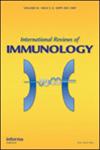How metabolism and metabolites shape immunity during disease
IF 2.9
4区 医学
Q2 IMMUNOLOGY
引用次数: 0
Abstract
Cellular metabolism is a complex biological process governed by numerous biochemical reactions that maintain various cellular processes essential for cell survival and continuity of life. It is not only important for the maintenance of host physiology, but also plays a crucial role in shaping the host’s defense system. The dynamicity of various immune components, immune responses and immune homeostasis during steady state or infection depends on the metabolic state of immune cells. Recently, it has been shown that various metabolite and metabolic enzymes play a pivotal role in the development of host immunity. This issue of International Reviews of Immunology focuses on the amino acid, sugar and lipid metabolisms and metabolic enzymes involved in host immunity during microbial infection and in different noninfectious defenses such as cancer, metabolic diseases and autoimmune diseases (Figure 1). Cancer is caused by multiple factors both intrinsic and extrinsic. Intrinsic factors include irreparable DNA damage, loss of cell cycle regulation, dysregulation of immunity or metabolism etc. The extrinsic factors can be physical, chemical, biological or environmental. Additionally, some microbial infections by an oncogenic virus or bacterial infection can result in the development of cancer. In this issue, the article by Pirzadeh et al. discusses the role of Helicobacter pylori and a few amino acid metabolisms and metabolites in immune suppression, which subsequently results in gastric cancer. This article will be of interest to a broad readership in the fields of onco-immunology and infectious disease biology as well as researchers active at the junction between metabolism, immunology and cancer biology (Figure 1). The innate and adaptive immune systems are strongly linked through dendritic cells (DCs) and the function of DCs can affect the disease outcome in infection as well as immune homeostasis in steady state. The article by Sun et al. describes how the alteration of available biomolecules in the DC microenvironment during metabolic diseases substantially affects the function of DCs. The altered microenvironment may cause immunopathogenesis of multiple diseases or enhancement of existing diseases. Also, the molecules which skew the metabolic condition can be a potential therapeutic agent. This article will be beneficial to readers working on the metabolic aspects of immunity and to clinical nutritionists working on disease control through the regulation of food intake (Figure 1). Tryptophan metabolism and its metabolic product play a crucial role in various biological processes such as neurotransmission, stabilization of the circadian rhythm and synthesis of vitamin B3 which are essential for the normal physiology of the host. The article by Moein et al. elaborates the immunological role of tryptophan metabolite and its impact on inflammatory bowel disease and colorectal cancer. The article also discusses how the small molecule-based metabolic or enzyme inhibitor could manage these diseases. The article by Heidari et al. describes how a key enzyme, Indoleamine 2, 3-Dioxygenase (IDO), plays a pivotal role in the kynurenine pathway. The metabolic product produce by the action of this enzyme has immunomodulatory function and affect subsets of T cells and its balance ensures protection against cancer and autoimmune diseases. The small molecule-based manipulation of IDO could be a potential drug for IDO imbalance in the treatment of cancer and/or autoimmune diseases. These two articles will be useful to pharmacologists, chemists developing enzyme inhibitors, rheumatologists, cancer immunologists and代谢和代谢物如何在疾病期间塑造免疫
细胞代谢是一个复杂的生物过程,由许多生物化学反应控制,维持细胞生存和生命连续性所必需的各种细胞过程。它不仅对宿主生理的维持有重要作用,而且在塑造宿主的防御系统中起着至关重要的作用。在稳态或感染状态下,各种免疫成分、免疫反应和免疫稳态的动态性取决于免疫细胞的代谢状态。近年来,各种代谢物和代谢酶在宿主免疫的发展中起着举足轻重的作用。本期《国际免疫学评论》重点关注微生物感染和不同非感染性防御(如癌症、代谢性疾病和自身免疫性疾病)中宿主免疫所涉及的氨基酸、糖和脂质代谢和代谢酶(图1)。癌症是由多种内在和外在因素引起的。内在因素包括不可修复的DNA损伤、细胞周期调节丧失、免疫或代谢失调等。外在因素可以是物理的、化学的、生物的或环境的。此外,一些由致瘤病毒或细菌感染引起的微生物感染可导致癌症的发展。在本期中,Pirzadeh等人的文章讨论了幽门螺杆菌和几种氨基酸代谢和代谢物在免疫抑制中的作用,从而导致胃癌。本文将引起肿瘤免疫学和传染病生物学领域的广大读者以及活跃于代谢、免疫学和癌症生物学之间的研究人员的兴趣(图1)。先天免疫系统和适应性免疫系统通过树突状细胞(dc)紧密联系在一起,dc的功能可以影响感染时的疾病结果以及稳态下的免疫稳态。Sun等人的文章描述了代谢疾病期间DC微环境中可利用生物分子的改变如何实质性地影响DC的功能。微环境的改变可能导致多种疾病的免疫发病或现有疾病的增强。此外,扭曲代谢状况的分子可以成为潜在的治疗剂。本文将有助于研究免疫代谢方面的读者和通过调节食物摄入来控制疾病的临床营养学家(图1)。色氨酸代谢及其代谢产物在各种生物过程中起着至关重要的作用,如神经传递、昼夜节律的稳定和维生素B3的合成,这些对宿主的正常生理至关重要。Moein等人的文章阐述了色氨酸代谢物的免疫作用及其对炎症性肠病和结直肠癌的影响。本文还讨论了基于小分子的代谢或酶抑制剂如何治疗这些疾病。Heidari等人的文章描述了一种关键酶,吲哚胺2,3 -双加氧酶(IDO)如何在犬尿氨酸途径中发挥关键作用。由该酶作用产生的代谢产物具有免疫调节功能,影响T细胞亚群,其平衡确保对癌症和自身免疫性疾病的保护。在癌症和/或自身免疫性疾病的治疗中,基于小分子的IDO操纵可能是治疗IDO失衡的潜在药物。这两篇文章将对药理学家、开发酶抑制剂的化学家、风湿病学家、癌症免疫学家和免疫学家有一定的参考价值
本文章由计算机程序翻译,如有差异,请以英文原文为准。
求助全文
约1分钟内获得全文
求助全文
来源期刊
CiteScore
11.00
自引率
4.00%
发文量
24
期刊介绍:
This review journal provides the most current information on basic and translational research in immunology and related fields. In addition to invited reviews, the journal accepts for publication articles and editorials on relevant topics proposed by contributors. Each issue of International Reviews of Immunology contains both solicited and unsolicited review articles, editorials, and ''In-this-Issue'' highlights. The journal also hosts reviews that position the authors'' original work relative to advances in a given field, bridging the gap between annual reviews and the original research articles.
This review series is relevant to all immunologists, molecular biologists, microbiologists, translational scientists, industry researchers, and physicians who work in basic and clinical immunology, inflammatory and allergic diseases, vaccines, and additional topics relevant to medical research and drug development that connect immunology to disciplines such as oncology, cardiovascular disease, and metabolic disorders.
Covered in International Reviews of Immunology: Basic and developmental immunology (innate and adaptive immunity; inflammation; and tumor and microbial immunology); Clinical research (mechanisms of disease in man pertaining to infectious diseases, autoimmunity, allergy, oncology / immunology); and Translational research (relevant to biomarkers, diagnostics, vaccines, and drug development).

 求助内容:
求助内容: 应助结果提醒方式:
应助结果提醒方式:


